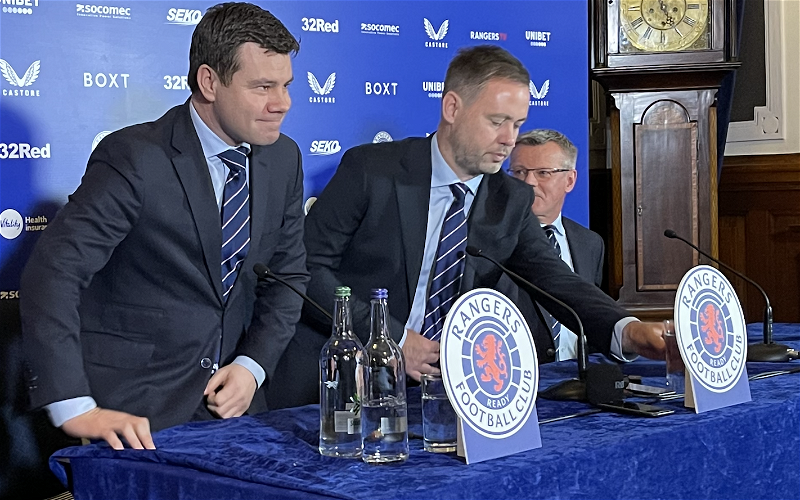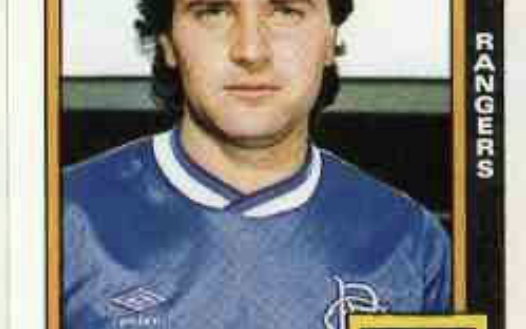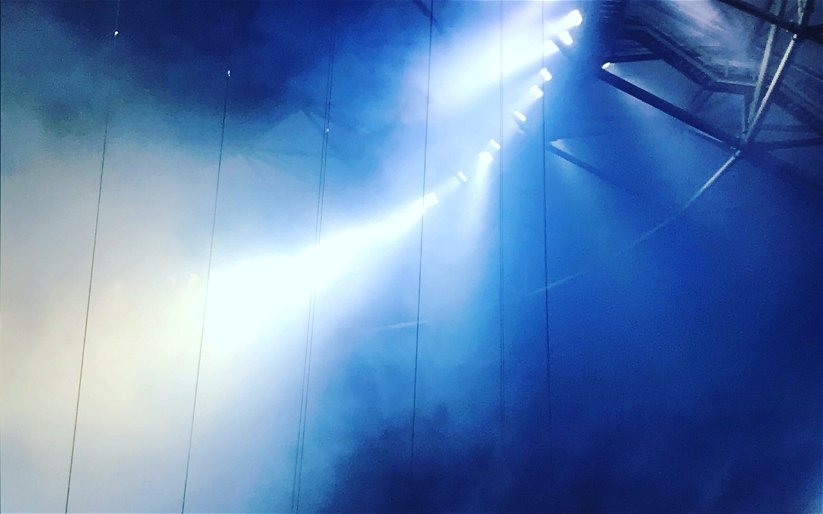By Alistair Aird
There was an air of inevitability about it all in the end when Michael Beale was announced as the eighteenth manager in Rangers Football Club’s illustrious history. A risky appointment most definitely, but it may well prove to be a masterstroke. After all, the last two managers that Rangers have recruited with little or no managerial experience – Walter Smith and Steven Gerrard – managed to carve their own niches in the history of our wonderful football club, so hopefully Michael will do likewise.
Born on 4 September 1980 in Bromley, Beale was a left winger in what turned out to be a somewhat brief playing career that included stints with Charlton Athletic and FC Twente Enschede. But he wasn’t out of the game for long after the boots were hung up as he soon discovered he had a penchant for coaching.
Beale started out in a church hall in Bromley, teaching kids to play Futebol de Salão or Futsal, and six months later he secured a part-time coaching role with Chelsea. That was in 2002 and he would remain at Stamford Bridge for a decade, coaching at a variety of levels in the Chelsea academy. A move to Liverpool followed in 2012 where he worked with a young Ryan Kent. Kent would make 26 appearances under Beale for the Liverpool U23’s, scoring nine times and claiming five assists. Perhaps the return of Beale may be the catalyst to reinvigorating Ryan as he for some time now he has been a pale shadow of the player that lit up the 55 season.
In January 2017 an opportunity to move to South America presented itself. Beale had met the legendary Rodrigo Ceni when Ceni had attended a coaching course in the UK. After meeting several top coaches in the country, Beale’s name was touted when it came to being one of the leading youth coaches in the UK. Ceni also watched Beale taking training and was so impressed that he offered him the job as his assistant manager when he took over his beloved Sao Paolo.
It was a long-held ambition for Beale to coach abroad. He was a lover of South American football, and hopefully that swashbuckling style of play will form part of his philosophy at Rangers. But his stay in Brazil would last just seven months, Ceni being dismissed in July after a series of poor results.
Beale returned to Liverpool but was soon heading north to Glasgow as part of Steven Gerrard’s coaching staff at Rangers. In the position of first-team coach he played a key role in revolutionising Rangers, the zenith of that revolution being the ‘invincible’ season 2020/21 that secured the coveted 55.
He has admitted that in that coaching role he wasn’t some sort of conduit between the dressing room and the manager’s office. Beale wasn’t friends with the players and admits to being something of a disciplinarian as he strode around the training pitch imparting the tactical blueprint that he played such a significant role in drawing up. That earned Beale respect, and the return of that approach will be a welcome one as it appeared that there was a growing disconnect between the players and Gio towards the end of the Dutchman’s reign.
That therefore sets the scene, but what has Beale done since leaving Rangers in November 2021 and just how much did Steven Gerrard rely on him?
Aston Villa
Many of those who have sat in the pro-Beale camp point to the fact that much of the success Steven Gerrard enjoyed during the fabled ‘55’ season was down to the handiwork and tactical nous of Beale. It is interesting then to compare Gerrard’s record at Villa with Beale at his right hand and without.
Gerrard’s managerial debut for Villa was a 2-0 win over Brighton and Hove Albion. That would be one of 10 victories Gerrard and his team secured as he and coaching staff navigated Villa to safety. But of the other 17 Premiership matches contested, Villa lost 12, including four-in-a-row between 13 March and 9 April. That amounts to a win percentage of 37.04%.
Following Beale’s departure to QPR, Gerrard oversaw 11 Premiership matches before he was dismissed following a 3-0 defeat against Fulham at Craven Cottage. Villa emerged victorious only twice which amounts to a win percentage of 18.18%.
Admittedly, the post-Beale era at Villa was a brief one, but results were certainly more positive when he was part of the backroom team than when he wasn’t.
QPR
Beale’s time at Loftus Road most certainly started on an upward trajectory. Although they lost 1-0 away at Blackburn on the opening day of the season, the R’s tasted defeat in only three of their next 15 Championship matches. Amongst that run was an unbeaten sequence of five games, and an emphatic 3-0 win over Cardiff City that propelled Beale’s side to the top of the table. It also earned Beale an opportunity to manage Wolverhampton Wanderers, an offer which he respectfully declined.
The position at the summit was consolidated courtesy of a home win over Wigan Athletic on 22 October – former Rangers centre back Leon Balogun was among the goals – but there are fine margins in the Championship as Beale was about to find out.
A run of five games without a win followed the Wigan win. Four of those games were lost, and after the last of them, a 2-0 defeat to Coventry City, QPR had slithered down to occupy seventh spot in the table, a mammoth TEN points adrift of leaders Burnley.
A similar topsy turvy start to his tenure at Ibrox won’t be well received, so where did it all go wrong?
Injuries played a part. Captain Stefan Johansen missed the last four matches of that dire run due to a heel injury that has ruled him out until after the World Cup. In the 16 appearances he did make he claimed six assists, including two in the win over Wigan. Tyler Roberts, the Welsh international striker, has been absent too, having returned to his parent club, Leeds United, for treatment on a calf injury.
Goals have dried up. Lyndon Dykes has scored six goals this season but has netted just once in his last six appearances. That was the only one goal scored in that five-match run, the opener in a 2-1 defeat at home against Huddersfield Town.
Chris Willock started with a bang, scoring six goals in his first nine appearances. But he is another who has been blighted by injury, and there is a feeling among the QPR fans that although he is back in the team, he still isn’t fit. One supporter also felt that Dykes needed support from others as he was ‘running his nuts off every game’.
Statistically Speaking
QPR won nine, drew four and lost eight of the Championship games Beale oversaw. Twenty-six goals were scored and 24 were conceded. In terms of a comparison, Middlesbrough, who are currently fourteenth, and eighteenth-placed Bristol City have scored more goals than QPR, while 10 of the 24 teams that make up the Championship have conceded more.
Beale’s side averaged 13.7 shots on goal per game, 4.4 of which, or 32.12%, were on target. Passing accuracy sat at 79.4%. Burnley, who currently top the table, have scored 40 goals, and have averaged 13.4 shots per game. The difference? Fine margins and a bigger budget perhaps? Burnley’s top scorer is Jay Rodriguez with nine goals, while Chris Willock has netted seven times for QPR. Rodriguez joined Burnley from WBA for a £10,000,000 package deal, while Willock cost a mere £750,000.
As another comparison, Gio’s Rangers have averaged just shy of 20 shots on goal in the 15 Premiership matches thus far, with 6.2 (31.31%) on target. Our passing accuracy sits at 85.3%, but it won’t come as a huge surprise that that figure is boosted by the fact that 91% of our accurate passes have come in our own half.
Possession play is key for Beale, but the lack of goals and cutting edge has clearly hindered him while in London. He spoke in the media conference about getting Morelos and Roofe back firing, so with attacking players of that ilk at his disposal at Ibrox, players who have shown how effective they can be when they press high and play on the front foot, Beale, with a forward-thinking approach in which he wants his attackers to ‘create havoc’, should be able to coax better numbers from his players.
Tactics
Having worked with Gerrard it won’t be much of a surprise that Beale favoured a variation of 4-3-3 at QPR. He opted for an ‘attacking’ variation of this in 11 of his 21 Championship matches, but results were mixed, QPR winning five and losing five of those fixtures. In the other matches, he opted for 4-2-3-1 on eight occasions, with solitary outings for 4-1-4-1 and 4-4-1-1 in the others.
That shows tactical flexibility, but I’m hopeful Beale won’t opt for 4-2-3-1 for us. There really is no need to play with two defensive midfielders in the Scottish Premiership even though we have a rich source of players in that area of the team.
I’d like us to be much more expansive and like the idea of 4-3-3. But the success of that system will rely heavily on the form of the front three.
Given his goal return, one would expect Antonio Colak to be in the centre. The Croatian has done superbly since coming in and if we adopt a more offensive approach then it stands to reason that our penalty box predator will get more chances to score. But it’s the other two roles that will be a test of Beale’s managerial mettle.
The form, or lack of it, of Ryan Kent has been the subject of many debates for a while now. We remain heavily reliant on his creative spark so given his previous productive working relationships with Beale at Liverpool (since the age of 14) and Rangers, we might just see his flagging Rangers career revived and reignited. Time will tell whether Kent decides to extend his stay in Glasgow, but even if he doesn’t, there is no doubt that an in-form Kent from now until May would stimulate rather than stymie us.
Beale also has to find a solution of the right-hand side of the attack. Another area of the team where we have a plethora of options who have been inconsistent and ineffective, Beale may try and convince our curmudgeonly Colombian he has a role to play there. Alfredo Morelos has been abject since he came back from injury, but we know from experience what a fit and firing Buffalo can bring.
It’s another ‘stick or twist’ dilemma for our new manager, but he has already spoken this week about discipline – I don’t think he’ll tolerate any strops – and his desire to keep Morelos at the football club, so maybe our new man can get El Buffalo back to his best. His line of ‘if trains like he did today, he will’ when asked if Morelos had a key role to play this season suggests that Beale has already had a positive impact.
At the back, the expected return of Connor Goldson in the New Year will be key, but one would hope to see more penetrating thrusts from James Tavernier and Borna Barisic. Both have seemed shackled this season under Gio, while under Steven Gerrard they seemed to have more licence to roam. Beale is likely to align with the latter approach and that can only be good for Rangers.
In midfield, Tom Lawrence will have a role to play. One of the few summer signings to make a positive impression, his return from injury will give Beale some guile in the heart of the pitch, and with John Lundstram doing what John Lundstram does alongside Lawrence and perhaps the precocious talents of Malik Tillman, Beale’s Rangers will be in a much better place.
Backing Beale
The role of reviving Rangers has been handed to Michael Beale. Although he’s a rookie, he has managed in a short space of time to get QPR to the top of one of the most competitive leagues in the country, and from what we can gather, their subsequent tumble down the table has been precipitated by injuries to key players as much as anything else.
The QPR fans hadn’t lost faith in Beale, on the contrary, the feeling was that if he could get his strongest XI on the park then they had a good chance to push back up towards the top end of the table again. After a 2-1 win over Reading, the talk was of players fighting for each other, a team that responded to setbacks by shrugging their shoulders and getting on with it. That’s what we want to see at Rangers.
Others espoused about it being a great time to be a QPR fan in the wake of the 3-0 win over Cardiff City, while others waxed lyrical about playing like Brazil. Hopes were high that Beale could lead a side that had been perennial underachievers to the Premiership’s promised land.
My initial view on Beale’s appointment was that it was short-sighted. But the more I read about his career and the more I hear him speak, the more I am convinced we are on the cusp of seeing Rangers return to something more recognisable under Michael Beale.
Good luck, Michael. His objective is to win 56 ‘as soon as possible’. Positivity and passion pour out of him. It’s infectious. Although he may have been in the background and in the shadow of Steven Gerrard, he is now his own man. The solution to our recent problems may indeed have been hidden in plain sight.



